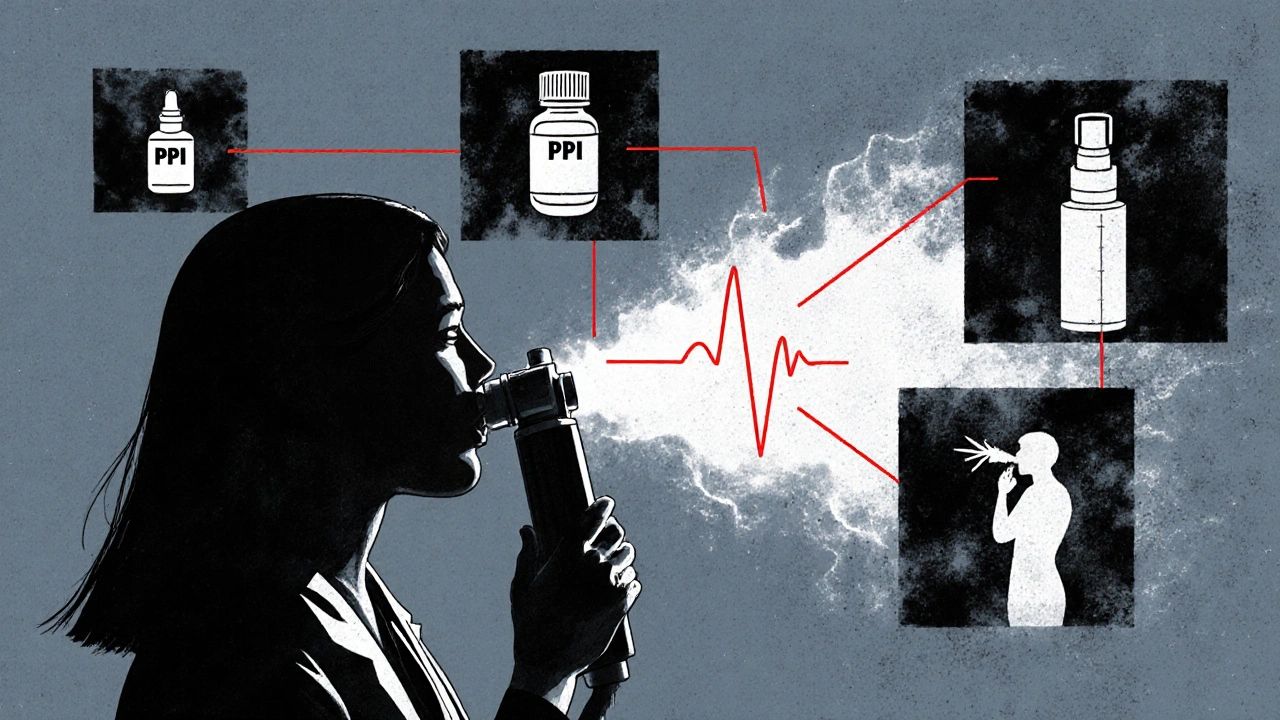Why Your Cough Won’t Go Away
If you’ve been coughing for more than eight weeks, you’re not alone. About 1 in 10 adults deal with a cough that just won’t quit. Most people try cough syrups, humidifiers, or even antibiotics-none of which fix the real problem. The truth? Your chronic cough is likely caused by one of three things: GERD, asthma, or postnasal drip. Together, these three conditions explain 80 to 95% of cases in people who don’t smoke or take ACE inhibitors. And here’s the kicker: treating them the wrong way can waste months, even years, of your life.
The Three Big Culprits
Let’s cut through the noise. You don’t need a CT scan or endless blood tests right away. Start with the big three.
- Upper Airway Cough Syndrome (UACS) - once called postnasal drip - is the most common cause, responsible for 38% to 62% of cases. It’s not just mucus dripping down your throat. It’s your airways becoming overly sensitive because of inflammation in your nose or sinuses. You might notice it worse after lying down, during cold weather, or around allergens like pollen or dust.
- Asthma - especially cough variant asthma - accounts for 24% to 29% of chronic cough cases. This version of asthma doesn’t cause wheezing or shortness of breath. The only symptom? A dry, persistent cough. It often gets worse at night or after exercise. Many people think they have a "cold that won’t leave," but it’s actually their airways tightening in response to triggers.
- GERD (gastroesophageal reflux disease) - causes 21% to 41% of chronic coughs. Here’s the surprise: up to 70% of people with GERD-related cough don’t have heartburn. This is called "silent reflux." Stomach acid travels up, irritates your throat, and triggers coughing - even if you feel fine after eating. It often happens when you lie down or bend over.
What Your Doctor Should Do First
Before jumping to treatments, your doctor needs to rule out the dangerous stuff. If you’ve lost weight, coughed up blood, have a fever, or have abnormal lung sounds, you need imaging or specialist referral right away. But if you’re otherwise healthy, the workup starts simple.
- Take a full history. When did the cough start? Did it begin after you started a new medication? ACE inhibitors (like lisinopril or enalapril) cause cough in 5% to 35% of users - often within weeks of starting them. If you’re on one, switching meds can fix your cough overnight.
- Do a chest X-ray. This isn’t optional. A normal X-ray rules out serious problems like lung cancer, tuberculosis, or bronchiectasis. You don’t need a CT scan unless the X-ray is abnormal. A standard CT exposes you to the same radiation as 74 chest X-rays - and only finds cancer in 0.1% of cases with a normal X-ray.
- Get spirometry. This simple breathing test checks for asthma. If your airflow is normal, a methacholine challenge test might be next. It’s the gold standard for diagnosing cough variant asthma when spirometry is normal.
How to Test for Each Cause - Without Guessing
Doctors don’t diagnose these conditions with lab tests alone. They use therapeutic trials. That means treating you for the suspected cause and seeing if your cough improves.
Testing for Postnasal Drip (UACS)
The first-line test? A 2- to 3-week trial of a first-generation antihistamine (like brompheniramine) plus a decongestant (like pseudoephedrine). These aren’t your typical allergy pills - they’re stronger and more sedating. If your cough drops by half or more in that time, UACS is likely the cause. Response usually happens within 1 to 2 weeks. If you don’t improve, move on.
Testing for Asthma
If your spirometry is normal, you might still have cough variant asthma. The next step? A 4-week trial of an inhaled corticosteroid (like fluticasone) or a combination inhaler (like fluticasone/salmeterol). If your cough improves significantly, asthma is the culprit. You might need to keep using the inhaler long-term. Some people think they’re "cured" after a few weeks and stop - then the cough comes back. Stick with it.
Testing for GERD
Here’s where things get tricky. A 4- to 8-week trial of high-dose proton pump inhibitors (PPIs) - like omeprazole 40mg twice daily - is still the standard. But here’s the catch: only 50% to 75% of people with GERD-related cough respond. And here’s the bigger problem: up to 40% of people who take PPIs for a cough get better even if they don’t have reflux. That’s the placebo effect.
That’s why newer guidelines (like the American College of Gastroenterology’s March 2024 update) warn against starting PPIs without evidence. If you’re not improving after 8 weeks, don’t keep taking them. You’re wasting time and risking side effects like bone loss or gut infections.

What Doesn’t Work
Let’s clear up some myths.
- Antibiotics? Only 1% to 5% of chronic coughs are caused by bacterial infections like pertussis (whooping cough). You need a special nasal swab to test for it - and most doctors don’t even think to order it.
- Over-the-counter cough syrups? They don’t work for these causes. They might numb your throat temporarily, but they won’t fix the inflammation, reflux, or airway sensitivity causing the cough.
- Just drinking more water? Hydration helps with mucus, but it won’t stop reflux or asthma. It’s not a treatment - it’s a band-aid.
When the Big Three Don’t Explain It
Even after testing all three, 10% to 30% of people still have a cough. That’s when you dig deeper. Possible causes include:
- Chronic refractory cough (CRC) - your cough reflex becomes hypersensitive. It’s not caused by asthma, GERD, or UACS. It just… won’t shut off. New drugs like gefapixant (approved in late 2022) and camlipixant (under FDA review) target this by blocking nerve signals that trigger coughing. In trials, they reduce cough frequency by 18% to 25%.
- Laryngopharyngeal reflux (LPR) - a subtype of GERD where acid reaches your voice box. It doesn’t cause heartburn but does cause throat clearing, hoarseness, and cough. The Hull Airway Reflux Questionnaire (HARQ) scores >13 suggest LPR with 80% accuracy.
- Allergic bronchitis or eosinophilic bronchitis - inflammation in the lungs without airway narrowing. It responds to inhaled steroids but not to asthma meds alone.
What You Can Do Right Now
You don’t have to wait for a specialist. Here’s how to start:
- Stop any ACE inhibitor. If you’re on lisinopril, enalapril, ramipril, or similar - ask your doctor about switching to an ARB like losartan. It won’t cause cough.
- Track your cough. Use a notebook or app. Note when it happens: after meals? At night? Around pets? After cold air? Patterns matter.
- Try simple lifestyle fixes. Elevate your head while sleeping. Avoid eating 3 hours before bed. Cut out caffeine, chocolate, spicy food, and alcohol - all common reflux triggers.
- Don’t self-medicate. Don’t buy PPIs or antihistamines without talking to your doctor. Wrong meds can mask the real issue.

How Long Until You Feel Better?
Patience is key. Here’s what to expect:
- UACS: Improvement in 1 to 2 weeks.
- Asthma: Improvement in 2 to 4 weeks.
- GERD: Improvement in 4 to 8 weeks.
If you don’t see progress by the end of the trial window, your doctor needs to reassess. Don’t keep going longer without a plan.
What’s Changing in 2025
The field is evolving fast. New tools are making diagnosis easier:
- AI cough analysis - a 2023 Lancet study showed AI can tell apart asthma, GERD, and UACS coughs with 87% accuracy just by listening to recordings.
- More precise reflux testing - pH impedance monitoring is becoming more accessible and is now recommended for people who don’t respond to PPIs.
- New cough drugs - gefapixant and camlipixant are changing the game for chronic refractory cough. They’re not first-line yet, but they’re giving hope to people who’ve suffered for years.
The bottom line? Your chronic cough isn’t "just a cough." It’s a signal. And with the right approach, you can find the cause - and fix it - without endless tests or guesswork.
Can GERD cause a cough without heartburn?
Yes. Up to 70% of people with GERD-related cough don’t feel heartburn at all. This is called "silent reflux." Acid travels up the esophagus and irritates the throat or voice box, triggering coughing - often at night or after meals - without the typical burning sensation. That’s why doctors rely on treatment trials and questionnaires like HARQ instead of symptoms alone.
Is a chest X-ray necessary for chronic cough?
Yes. A normal chest X-ray rules out serious conditions like lung cancer, tuberculosis, or bronchiectasis. Most guidelines say you don’t need a CT scan unless the X-ray is abnormal. A CT exposes you to high radiation and rarely finds anything useful if the X-ray is clear.
Do I need a breathing test for asthma if I don’t wheeze?
Yes. Cough variant asthma has no wheezing - the only symptom is a persistent cough. Spirometry might be normal, but a methacholine challenge test can confirm it. A 4-week trial of an inhaled steroid is often used to test for it, especially if spirometry is normal.
Why do some people get better on PPIs even if they don’t have GERD?
About 35% to 40% of people who take PPIs for chronic cough improve - even if they don’t have acid reflux. This is called the placebo effect. The act of taking medication, believing it will help, and making lifestyle changes (like avoiding late meals) can reduce coughing. That’s why newer guidelines say not to start PPIs without evidence - because it can delay the real diagnosis.
Can I treat postnasal drip with regular allergy pills?
No. Regular non-sedating antihistamines (like loratadine or cetirizine) rarely help. The most effective treatment is a first-generation antihistamine (like brompheniramine) combined with a decongestant (like pseudoephedrine). These are stronger and more likely to reduce the inflammation and mucus that trigger coughing. They’re not for long-term use, but they’re key for testing.
Next Steps
If your cough has lasted more than 8 weeks, don’t wait. Start by reviewing your medications - especially ACE inhibitors. Track your symptoms. Talk to your doctor about the big three: UACS, asthma, and GERD. Ask about spirometry, a chest X-ray, and therapeutic trials. Don’t accept "it’s just a cough" as an answer. With the right approach, you can get back to living without constant coughing.


Joe Goodrow
November 14, 2025 AT 12:22Don Ablett
November 15, 2025 AT 18:58Chris Ashley
November 17, 2025 AT 13:11kshitij pandey
November 17, 2025 AT 22:20Brittany C
November 19, 2025 AT 11:36Sean Evans
November 20, 2025 AT 21:54Anjan Patel
November 22, 2025 AT 14:34Scarlett Walker
November 22, 2025 AT 19:12Hrudananda Rath
November 24, 2025 AT 16:20Brian Bell
November 26, 2025 AT 02:42Nathan Hsu
November 26, 2025 AT 20:05